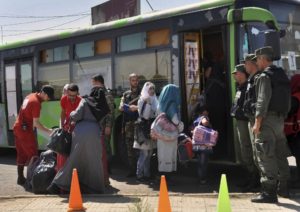Syrians forced to return home by Lebanon
Thousands of civilian refugees and rebel fighters who fled Syria for safety in Lebanon are being forced to return to their war-ravaged homeland.
Hezbollah and other groups in control of parts of Lebanon have deemed there is now a ‘safe zone’ in Syria to which refugees and fighters can be returned.
But aid groups say the transportation move lacks transparency and offers few guarantees about the returnees’ welfare.
Some say that it is really a security measure to protect Lebanon from extremists and others says in amounts to a forceful removal of vulnerable refugees that could herald wider-scale expulsions.
 Buses begin transporting 3,000 Syrian people from a remote area in northeastern Lebanon to Syria this week.
Buses begin transporting 3,000 Syrian people from a remote area in northeastern Lebanon to Syria this week.
The United Nations has played no role in either of two repatriation exercises and has cautioned that the conditions for safe return have not been met. Although they have been cast as voluntary, some senior UN officials believe many of those who have crossed into Syria have had little choice in their departure and that the move has been contrived to suit political ends.
The move is the result of a deal brokered earlier this month that saw more than 7,000 Syrians who had been living near the city of Arsal in northern Lebanon back to Syria, the first major return of refugees from Lebanon since Syria’s war began six years ago.
The deal was brokered between Hezbollah, a Syrian militant group called Fatah Al Sham, and the governments of Lebanon and Syria. It is a departure from the Lebanese government’s previous stance that refugee returns to Syria should be guaranteed by the United Nations.
The removals come as increasingly strident rhetoric against refugees in Lebanon is being aired publicly, mostly by local politicians with ties Syrian leader Bashar al-Assad
More than a million Syrians are registered with the UNHCR in the Lebanese capital Beirut, but at least another 500,000 are thought to be scattered throughout the country.
Syrians in Beirut have increasingly claimed that the government is attempting to push them back to Syria, where the Assad regime has gradually gained back control over parts of the country, with backing from Iran and Russia.
Despite an ease in the fighting, much of Syria remains ravaged by war and refugees have expressed fears that they would be vulnerable to persecution if they returned.
Laurie Nowell
AMES Australia Senior Journalist












